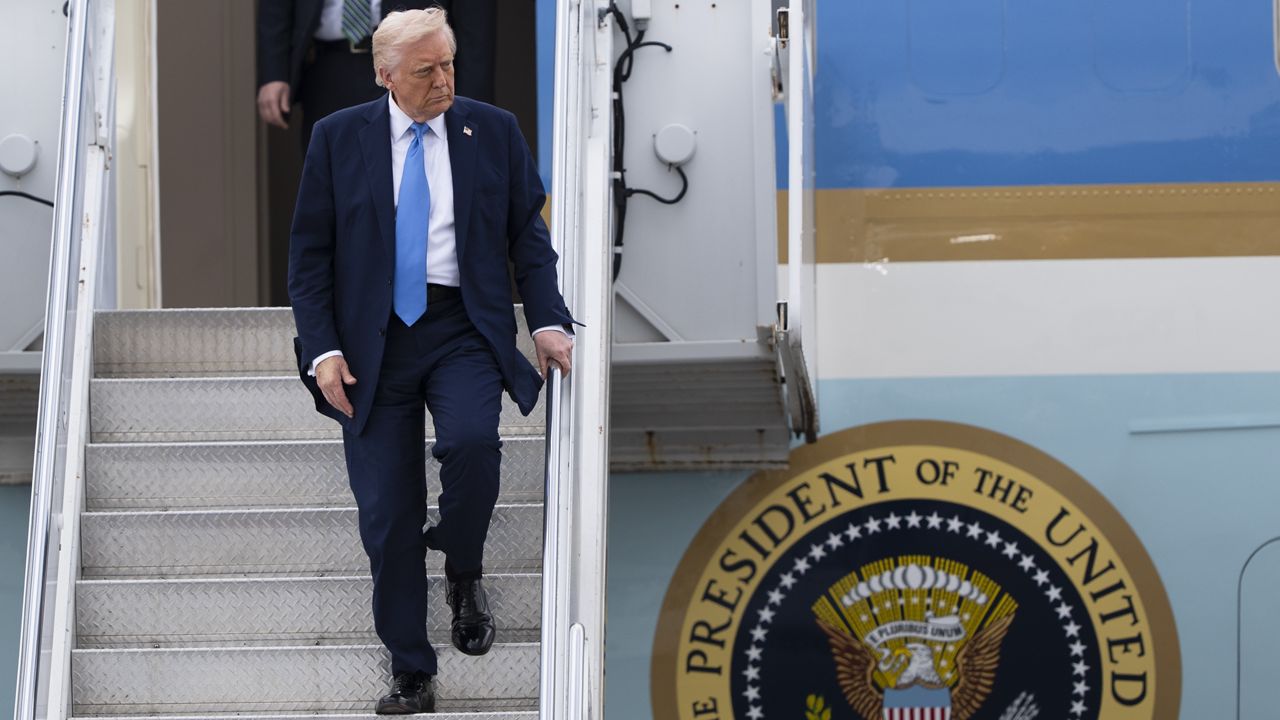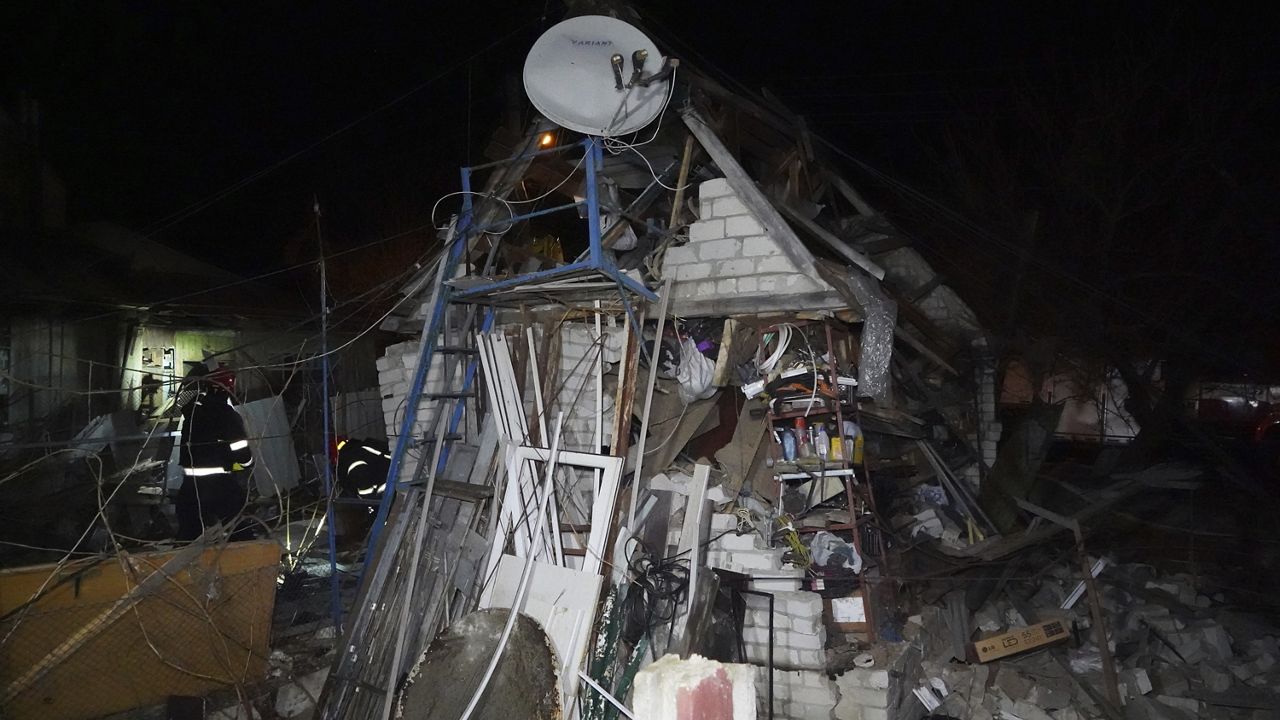President Joe Biden remained hopeful on Thursday even as House Republicans pushed debt ceiling talks to the brink, displaying risky political bravado as they prepare to leave Washington for the holiday weekend — just days before the U.S. could face an unprecedented default that could hurl the global economy into chaos.
"[House] Speaker [Kevin] McCarthy and I have had several productive conversations and our staffs continue to meet as we speak," Biden said at an event to introduce his pick to be the next Chairman of the Joint Chiefs of Staff. "I made clear time again, defaulting on our national debt is not an option. The American people deserve to know that their Social Security payments will be there, that veterans' hospitals remain open."
"Default puts all that at risk," Biden said. "Congressional leaders understand that and they've all agreed there will be no default."
What You Need To Know
- Both President Joe Biden and House Speaker Kevin McCarthy are expressing optimism about a deal as House Republicans plan to leave Washington for the holiday weekend.
- Negotiators reconvened virtually at 11:30 a.m. Thursday, White House press secretary Karine Jean-Pierre said, after Speaker McCarthy said they worked into the early morning hours starting the day before
- Speaker Kevin McCarthy said he's directed his negotiating team “to work 24/7 to solve this problem," adding that a deal could come together "at any time"
- While Biden has ruled out, for now, invoking the 14th Amendment to raise the debt limit on his own, Democrats in the House announced they have all signed on to a legislative "discharge" process that would force a debt ceiling vote; But they need five Republicans to break with their party and tip the majority to set the plan forward
Negotiators reconvened virtually at 11:30 a.m. Thursday, White House press secretary Karine Jean-Pierre said, after Speaker McCarthy said they worked into the early morning hours starting the day before.
"That is a good sign," Jean-Pierre said. "There's a path forward to a bipartisan, reasonable budget agreement and and as long as both sides understand that no one is going to get everything that it wants, then we can get there."
Speaker Kevin McCarthy said he's directed his negotiating team “to work 24/7 to solve this problem," adding that a deal could come together "at any time."
The White House, said negotiations by video conference were ongoing between Biden's staff and McCarthy's, with the president assessing that talks remained productive though serious disagreements remained.
“The negotiations we’re having with Speaker McCarthy are what the budget will look like, not about default," Biden said in remarks at an event announcing Air Force Gen. CQ Brown Jr. as his nominee to be the next Joint Chiefs of Staff chairman. “It’s about competing versions of America.”
“The only way to move forward is with a bipartisan agreement,” he added. “And I believe we’ll come to an agreement that allows us to move forward and protects the hardworking Americans of this country.”
A defiant McCarthy said the debt ceiling standoff was "not my fault" as Republican negotiators and the White House failed to finish out talks. He warned they need more time to try to reach a budget-slashing deal with Biden.
But it's clear the Republican speaker — who leads a Trump-aligned party whose hard-right flank lifted him to power — is now staring down a potential crisis.
McCarthy told reporters he spoke to former President Donald Trump "the other day," who told him to get a "good agreement" on the debt limit. The speaker also said he's been in contact Senate Minority Leader Mitch McConnell, R-Ky.
Trump, in the midst of a bid to return to the White House, has encouraged Republicans to "do a default" if they don't get the deal they want from the White House.
Lawmakers are tentatively not expected back at work until Tuesday, just two days from June 1, when Treasury Secretary Janet Yellen has said the U.S. could start running out of cash to pay its bills and face a potentially catastrophic default.
Fitch Ratings agency placed the United States' AAA credit on "ratings watch negative," warning of a possible downgrade because of what it called the brinkmanship and political partisanship surrounding the debate over lifting the debt ceiling.
"This is a battle between extremism and common sense," said Democratic Rep. Katherine Clark of Massachusetts, the minority whip.
The Republicans, she said, "want the American people to make an impossible choice: devastating cuts or devastating debt default."
Weeks of negotiations between Republicans and the White House have failed to produce a deal — in part because the Biden administration never expected to be having to negotiate with McCarthy over the debt limit, arguing it should not be used as leverage to extract other partisan priorities.
"I want to be clear that the negotiations we're having with Speaker McCarthy is about the outlines of what the budget will look like, not about default," Biden said on Thursday.
McCarthy is holding out for steep spending cuts that Republicans are demanding in exchange for their vote to raise the nation's borrowing limit. The White House has offered to freeze next year's 2024 spending at current levels, but the Republican leader says that's not enough.
"We have to spend less than we spent last year. That is the starting point," said McCarthy, R-Calif.
McCarthy told reporters Thursday morning that negotiators worked "well past midnight" and that progress was made.
"There's still some outstanding issues, and I've directed our teams to work 24/7 to try to solve this problem," he said.
"I think we've been close for 6 or 7 days," said North Carolina Rep. Patrick McHenry, one of McCarthy's top GOP negotiators. "The issues are thorny, they’re difficult, there is a will to get a deal."
McHenry said that the White House's sense of urgency to reach an accord has changed, calling it a "hopeful sign."
House Majority Leader Steve Scalise, the No. 2 Republican in the lower chamber, offered a similar sentiment about the state of negotiations: "They're moving more positive, but we're still not there."
Failure to raise the nation's debt ceiling, now at $31 trillion, would risk a potentially chaotic federal default, almost certain to inflict economic turmoil at home and abroad. Anxious retirees and social service groups are among those already making default contingency plans.
Even if negotiators strike a deal in coming days, McCarthy has promised lawmakers he will abide by the rule to post any bill for 72 hours before voting — now likely Tuesday or even Wednesday. The Senate, where Democratic Majority Leader Chuck Schumer has vowed to move quickly, would also have to pass the package before it could go to Biden's desk to be signed into law, right before next Thursday's possible deadline.
"Every hour matters," McCarthy said. "That's why the White House has to become very serious. And that's why we worked well past midnight last night."
The contours of a deal have been within reach for days, but Republicans are unsatisfied as they press the White House team for more.
In one potential development, Republicans may be easing their demand to boost defense spending, instead offering to keep it at levels the Biden administration proposed, according to one person familiar with the talks and granted anonymity to discuss them.
The Republicans may achieve their goal of of rolling back bolstered funding for the Internal Revenue Service if they agree to instead allow the White House to push that money into other domestic accounts, the person said.
At the White House on Wednesday, Jean-Pierre blamed Republicans for risking a devastating default that would hit "every single part of the country" as they demand "extreme" spending cuts that would hurt millions of Americans.
She decried what the administration called a "manufactured crisis" set in motion by the GOP.
The White House has continued to argue that deficits can be reduced by ending tax breaks for wealthier households and some corporations, but McCarthy said he told the president as early as their February meeting that raising revenue from tax hikes was off the table.
Time is short to strike a deal. Yellen said Wednesday that "it seems almost certain" that without a deal the United States would not make it past early June without defaulting. "We are seeing some stress already in Treasury markets," she said at a Wall Street Journal event.
While Biden has ruled out, for now, invoking the 14th Amendment to raise the debt limit on his own, Democrats in the House announced they have all signed on to a legislative "discharge" process that would force a debt ceiling vote. But they need five Republicans to break with their party and tip the majority to set the plan forward.
"Sign the bill!" Democrats yelled on the House floor after Republican Majority Leader Steve Scalise of Louisiana announced the holiday recess schedule.
Jean-Pierre on Thursday said "there is no alternative" to a bipartisan deal.
Agreement on a topline spending level is vital. It would enable McCarthy to deliver spending restraints for conservatives while not being so severe that it would chase off the Democratic votes that would be needed in the divided Congress to pass any bill.
"We've been having discussions about what the overall spending number will be," Scalise said Thursday, adding: "Whatever the final agreement would be, would include, I'm sure, final spending numbers which would be lower than current year."
But what, if anything, Democrats would get if they agreed to deeper spending cuts than Biden's team has proposed is uncertain.
McCarthy and his Republican negotiators said what the Democrats get is a debt ceiling increase — typically something both parties take responsibility for doing.
"The problem is not the White House. The problem is Kevin McCarthy and the extreme Republicans," said Rep. Pramila Jayapal, D-Wash., the chair of the progressive caucus. "They are the ones holding this economy hostage, that are putting all these cuts on the American people."
McCarthy hit back on Thursday, charging that Democrats have moved too far to the left and saying that their anger at Biden for negotiating with him is misplaced.
"When the Democrats wouldn't talk to us, when we put our bills out, I tried to grab ideas, conservative ideas that Democrats had," he said. "Sen. Biden voted for work requirements, [West Virginia Sen.] Joe Manchin says cap government [spending] at 1% going forward. The difficult part is the Democrats today are not the same Democrats."
"We see them up their anger right now against the president when he's trying to curb spending at the same time negotiating with me," McCarthy added. "That's not productive, it's very challenging."
But it's not just Democrats who are leery of McCarthy making a deal with the White House, some conservative House Republicans urging the speaker to stand firm.
"Don't take an exit ramp five exits too early," said Texas Rep. Chip Roy on Thursday. "Let's all hold the line and do what we said we were going to do for the American people."
When asked if he could support a package backed by Democrats and President Biden, Roy replied: "If they do what's right for the country, if they actually take the positions that need to be taken."
"Right now, I'm not hearing that," he added. "We'll see what happens."
The negotiators are now also debating the duration of a 1% cap on annual spending growth going forward, with Republicans dropping their demand for a 10-year cap to six years, but the White House offering only one year, for 2025.
Republicans want to beef up work requirements for government aid to recipients of food stamps, cash assistance and the Medicaid health care program that the Biden administration says would impact millions of people who depend on assistance.
All sides have been eyeing the potential for the package to include a framework to ease federal regulations and speed energy project developments. They are all but certain to claw back some $30 billion in unspent COVID-19 funds now that the pandemic emergency has officially been lifted.
The White House has countered by proposing to keep defense and nondefense spending flat next year, which would save $90 billion in the 2024 budget year and $1 trillion over 10 years.









